Compiled by Layla Melendez, Communications Intern
Sustainability, agricultural innovation, and environmental conservation continue to be pressing matters as our global community deals with the effects of climate change. International exchange initiatives like the International Visitor Leadership Program (IVLP) make it possible for emerging leaders globally to connect and exchange ideas about forward-thinking solutions. From exploring wastewater reuse methods in Las Vegas and marine conservation efforts in Jacksonville, to delving into sustainable agriculture practices in Northern Nevada and Montana, IVLP participants received a wide look at how the United States works to protect our environment.
World Affairs Council of Las Vegas
IVLP: Wastewater Reuse and Water Conversation
NPA: Meridian International Center
By Amélie Pontbriand, Program Coordinator
Our IVLP project, “Wastewater Reuse and Water Conservation,” brought seven emerging leaders from Mexico to the United States to exchange ideas. Focused on Baja California’s dependency on Colorado River water, we discussed ways to promote the awareness of water scarcity and conserve natural resources. Throughout the project, we highlighted the re-use of treated wastewater for industrial and agricultural purposes, while building support for potable water reuse. The visitors met with Las Vegas city officials, tour guides at the Hoover Dam, and members of the International Boundary and Water Commission and the Colorado River Commission to exchange solutions for better usage of wastewater.
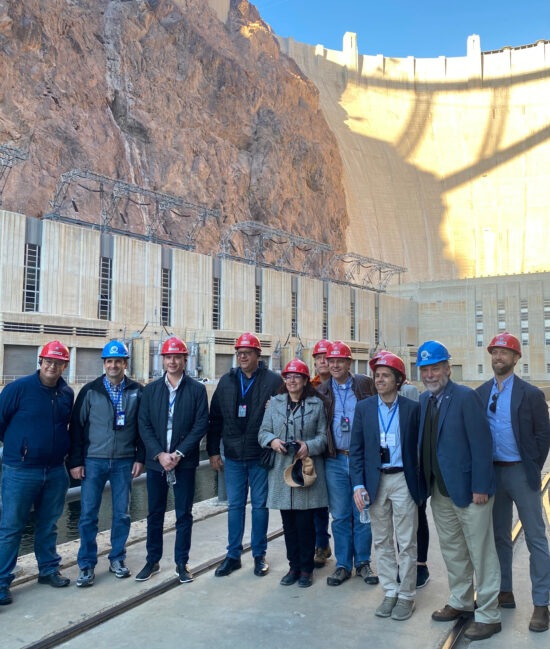
The delegation poses for a photo during a Hoover Dam tour. Photos provided by World Affairs Council of Las Vegas.
The participants attended the Colorado River Water Users Association Conference at the Paris Hotel where they met individuals from the U.S. Environmental Protection Agency, the International Boundary and Water Commission, as well as professionals from Arizona, California, and Texas at the conference to discuss the Colorado River supply. They also enjoyed a VIP tour of the Hoover Dam and the Las Vegas Wetlands Park, a 2,900-acre park shaped by urban runoff, shallow groundwater, storm water, and reclaimed water that flows through the Las Vegas Wash and into Lake Mead.
Participants truly enjoyed the Las Vegas Wash and taking a look at conservation efforts here in Nevada! The delegation was impressed by the innovative ways we are addressing water scarcity and preserving natural resources, returning home eager to put what they learned to use in their own communities.
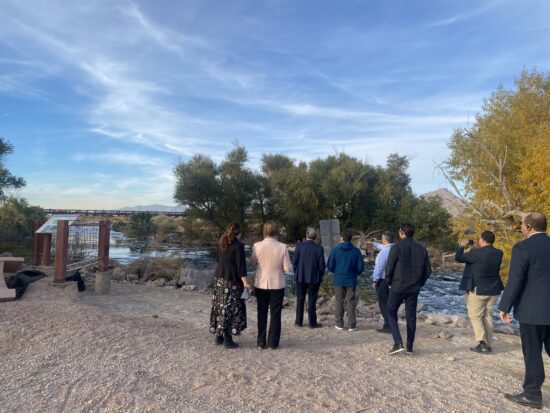
The IVLP group tours the Las Vegas Wash, a 12-mile-long channel that feeds water runoff from the Las Vegas Valley into Lake Mead.
Northern Nevada International Center
IVLP: Agricultural Modeling and Climate Impacts Assessment
NPA: Mississippi Consortium for International Development (MCID)
By Dominique Stedham, IVLP Program Manager
Northern Nevada International Center (NNIC) was proud to collaborate with the Mississippi Consortium for International Development (MCID) on the implementation of the IVLP “Agricultural Modeling and Climate Impacts Assessment.” This program, held in October 2023, aimed to foster international dialogue and collaboration on climate change and sustainability within the agricultural sector. The delegates had the chance to engage with various stakeholders in Nevada, gaining insights into sustainable agricultural practices and climate adaptation strategies.
The program commenced with a panel discussion hosted by the Nevada Farm Bureau Federation and the Nevada Department of Agriculture. Delegates explored advocacy efforts aimed at balancing the interests of farmers and environmental conservation. The panel emphasized inclusive programs engaging members in agricultural events and highlighted the regulatory role of the Nevada Department of Agriculture in promoting sustainable practices.
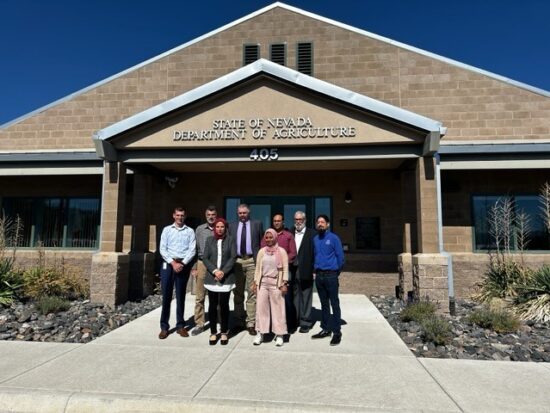
IVLP participants visit Nevada’s Department of Agriculture. Photos provided by Northern Nevada International Center.
The IVLP group also visited the Desert Farming Initiative (DFI) and the Main Station Ranch, where they learned about federally funded agricultural research and innovative practices in high desert farming. Here, the delegates also met with the founders of Prema Farm, where they explored methods for developing climate-friendly organic farms in desert environments.
A pivotal moment unfolded with a visit to the Northern Paiute Tribe, Kuyuidökadö, reservation. Delegates engaged with Indigenous leaders and community members, discussing Indigenous approaches toward increasing farm yields and promoting healthier lifestyles within their tribal community. The session delved into the federally recognized University of Nevada Cooperative Extension Indian Reservation Program’s efforts in supporting Native American farmers, ranchers, and youth through community outreach and practical programming, emphasizing agricultural productivity and youth development.
Following this enlightening meeting, we were invited to meet the presenter’s family, offering deeper insights into the local Indigenous community. They visited the presenter’s mother, a teacher at a local reservation elementary school, and engaged in discussions with students that emphasized the significance of environmental education and community involvement. Additionally, delegates explored the presenter’s father’s fish hatchery, witnessing firsthand the conservation efforts aimed at preserving the Lahontan Cutthroat Trout from extinction. These experiences shed light on the profound connection between Indigenous heritage and environmental preservation, leaving a lasting impact on the delegates’ understanding of sustainability and stewardship.
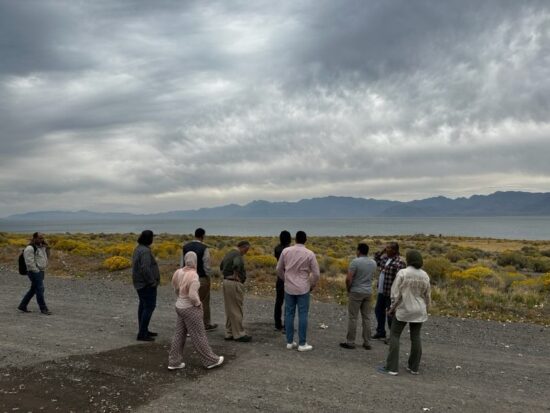
The IVLP delegation visits Northern Paiute tribe reservation.
Engaging with Indigenous communities and local stakeholders underscored the significance of incorporating diverse perspectives into climate change mitigation strategies. Delegates recognized the importance of inclusive approaches and collaborative partnerships in addressing environmental challenges.
The Agricultural Modeling and Climate Impacts Assessment IVLP program provided delegates with practical insights into sustainable agriculture and climate adaptation. Through meaningful interactions and experiential learning, delegates gained a deeper understanding of the interconnectedness between agriculture, climate change, and Indigenous knowledge.
GlobalJax
IVLP: Understanding Sustainable Tourism: The Role of Marine Protected Areas in Mitigating Climate Change
NPA: CRDF Global
By Kristina Escudero, Program Director
GlobalJax had the privilege to share our community with a delegation of 10 leaders in marine environmental conservation and sustainable tourism from Jordan. While in Jacksonville, the delegation met with leaders at the Guana Tolomato Matanzas National Estuarine Research Reserve, the City of Atlantic Beach, local nonprofits St. Johns Riverkeeper and Beaches Go Green, and Resiliency Planner Sean Lahav. They also travelled down to St. Augustine, Florida for historic and cultural activities in the oldest city in the United States. Here, our IVLP group attended an interactive meeting and boat tour from St. Augustine Eco Tours, where they discussed sustainable tourism practices with the company’s founder, Zack McKenna. We were honored to facilitate a conversation with the Florida Department of Environmental Protection and local nonprofit Friends of the GTM Reserve about the marine research and monitoring surrounding rising rides, warming waters, and storm surge from hurricanes taking place at the Guana Tolomato Matanzas National Estuarine Research Reserve. We also spoke about the importance of mangroves in the region as climate change indicators. The delegation was interested in learning more about how our hosts promote education and sustainable tourism activities for schools and local citizens in Northeast Florida’s coastal towns. This combination of research, education, and conservation hub was a perfect example of how this protected land and marine estuary is properly stewarded.
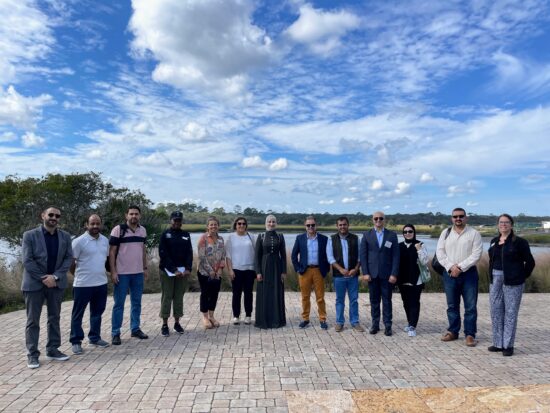
The delegation visits Guana Tolomato Matanzas National Estuarine Research Reserve to learn more about marine research. All photos provided by GlobalJax.
Another highlight of the program was meeting with grassroots organizer and founder of Beaches Go Green, Anne Marie Moquin, who dedicates her life to marine plastic and climate change awareness in our community. The delegation marveled at her high school youth clubs and her strategies to engage young teens around climate change awareness and marine protection. That dedication, paired with her wonderful partnership with the coastal City of Atlantic Beach, where the non-profit was founded, is a great public-private partnership that the delegation was happy to see. The City of Atlantic Beach was also able to provide the delegation with a local government perspective on resiliency and climate adaptation planning in their highly touristic beach town. At the end of our visit, Anne Marie gifted each delegate a Beaches Go Green reusable water bottle for them to take home!
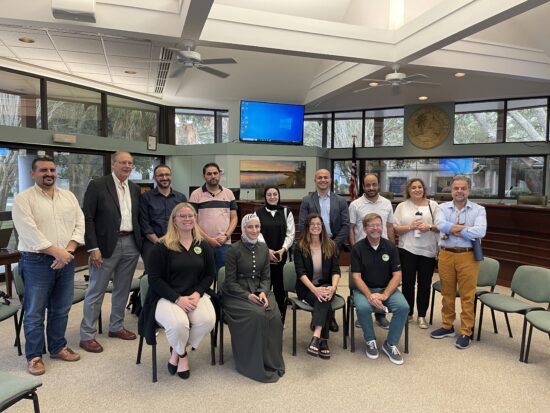
IVLP participants get local government aspect of environmental conservation with the City of Atlantic Beach officials.
Finally, our Executive Director, Andrea Myers, opened her home for a home hospitality meal with the delegation. We enjoyed a home cooked meal while sharing insights about each of our city’s beaches, parks, and waterways. This also included a competition where we shared our favorite sunset photos from around the world. We even received a special invite to visit a participant’ Beach Club at the Aqaba-Tala Bay Resort, which we would love to see happen soon.
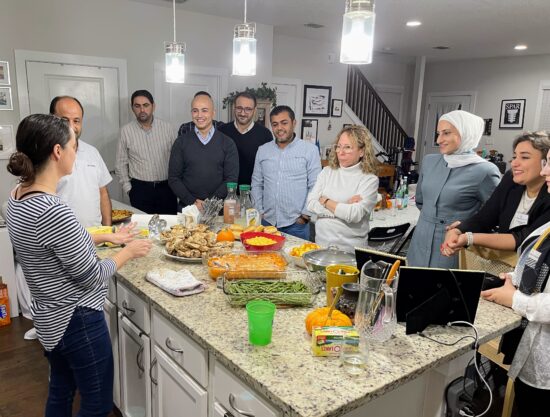
The delegation joins Executive Director Andrea Myers for a home cooked meal.
We are so proud of this delegation and everything they have achieved for Jordan. They are truly the environmental leaders their country needs, and we were honored to share our wonderful parks, marine, and river environments around Jacksonville with them. Because this project aligned just before the start of Thanksgiving, we also took turns writing down what we are grateful for and shared those stories with the group. Many of the expressions of gratitude had to do with finding shared common goals with Jacksonville leaders about protecting our world, especially our marine environments for future generations to come. It was a fulfilling IVLP all around, and GlobalJax was honored to take part.
WorldMontana
IVLP: U.S Agricultural Technology Practices
NPA: FHI 360
By Deb Mitchell, Executive Director
On November 16, 2023, WorldMontana welcomed 14 visitors from Pakistan to experience how technology has improved Montana’s farming, ranching, and crop productions. The group flew into Bozeman, the heart of the Gallatin Valley, and were looking forward to a busy schedule.
We hit the ground running the next day with an early start at the Barney Creek Ranch, owned by Meagan and Pete Lannon, passionate landowners who are actively committed to promoting biodiversity and holistic management of practical ranching and farming. You could feel a very earthy connection between Pete, Meagan, and the visitors. While getting their hands dirty, our participants and our hosts discussed similarities and differences between Montana and Pakistan’s farming conditions and crops.
Chris Mehus, Executive Director of Western Sustainability Exchange later joined us at the ranch to talk about soil conditions and how to improve soil health. To help the group visualize what he was speaking about, Chris demonstrated map-based software that measured key metrics for creating healthy range plants and soils, along with testing soils.
Lunch was spent in Livingston, providing an opportunity for reflection, questions, and discussions. By the time Meagan had left, the possibility of a visit for her to Pakistan was up in the air. In the afternoon, we made our way to was spent with the Park County Extension Office, talking about opportunities and issues they have, and receiving an overview of field projects in the works. The visitors left Livingston tired, but eager to learn more, and looking forward to a weekend of cultural experiences.
That Saturday, the delegates immersed themselves into a Jurassic Park experience, examining dinosaur bones on display at the Museum of the Rockies. The visitors were guided by Ashley Hall, the museum’s Educational Curator, and they loved the fact that Ashley invited them into the small booth where museum staff facilitates video discussions to schools and other educational programs; many in the group were curious to see if this could be provided to them at their homes abroad. The following day, we set out for a well-deserved relaxing day at the Bozeman Hot Springs, where 12 pools are naturally heated to temperatures ranging from 59 to 106 degrees. The group came back relaxed and re-energized, loving the experience.
Monday was spent touring the campus of Montana State University. Walt Sweitzer, President of Montana Farmers Union, visited the group and spoke about the Montana Farmers Union and his experience with the World Farmers Organization. From here, the group continued for an afternoon tour of the Agricultural Program at MSU, through their plant growth center and diagnostic, barley and cereal labs. On Tuesday, our visitors spent the day with Kurt Dykema, who introduced two major irrigation projects in Manhattan, Montana. (Yes, we also have a Manhattan, but quite the opposite of the one in New York, rather a small farming area west of Bozeman.)
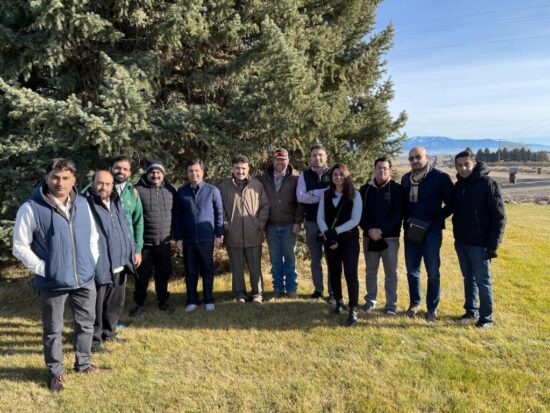
The IVLP group spends time outdoors in Manhattan, Montana. Photo provided by WorldMontana.
I was able to spend the entire time with this group, and our “down” time was spent visiting, laughing, eating, and exploring the area. We even drove to Bridger Bowl, a ski area, where the group played in the snow, and witnessed the natural beauty of Montana. World Montana was proud to sponsor this group and experience the diplomatic impacts made through our efforts and those of the Global Ties Network.
